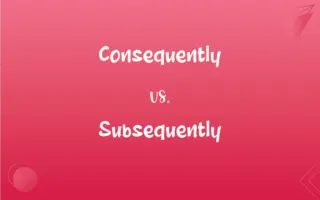Hostility vs. Aggression: What's the Difference?
Edited by Harlon Moss || By Janet White || Published on November 17, 2023
Hostility is a persistent state of unfriendliness or opposition, while aggression is a forceful, attacking behavior, either verbally or physically.

Key Differences
Hostility implies a state or attitude of being antagonistic, unfriendly, or opposed, while aggression is about the expression or act of initiating harmful or destructive behavior towards others. Hostility can be passive or unexpressed but can fuel aggression, which is more overt and can be both verbal and physical.
Hostility can manifest as ill will, bitterness, or an antagonistic stance toward others, often brewing internally. On the contrary, aggression typically involves more outward actions, manifesting as attacks or forceful attempts to inflict harm or dominate.
Hostility is often linked with feelings of anger, resentment, or disdain, and it may or may not lead to aggressive actions. Aggression, meanwhile, signifies the enactment of hostile feelings through destructive behaviors or actions intended to harm or dominate.
Hostility can be a long-lasting disposition or a temporary state, representing the emotional and attitudinal aspect of antagonism. In contrast, aggression represents the behavioral aspect, whether as an impulsive reaction or a premeditated act.
Both hostility and aggression can impact interpersonal relationships and can be detrimental to mental and physical health. However, aggression tends to have more immediate and observable consequences, while hostility may lead to prolonged stress and tension.
ADVERTISEMENT
Comparison Chart
Nature
An attitude or state of unfriendliness or opposition.
An act or behavior intending harm or dominance.
Manifestation
Can be passive or unexpressed.
Is overt and can be both verbal and physical.
Duration
Can be long-lasting or temporary.
Can be impulsive or premeditated.
Underlying Emotion
Often linked with anger, resentment, or disdain.
Driven by hostile feelings or instincts.
Impact
Can lead to prolonged stress and tension.
Has immediate and observable consequences.
ADVERTISEMENT
Hostility and Aggression Definitions
Hostility
A continuous feeling or expression of enmity or animosity.
The ongoing hostility between the two nations raised concerns about potential conflict.
Aggression
The expression of forceful or attacking behavior towards others.
The player received a penalty for his unwarranted aggression during the game.
Hostility
A sustained form of antagonism or unfriendliness.
The hostility between the two rival factions was palpable.
Aggression
A forceful behavior or attitude with the intent to dominate or harm.
The dog showed sudden aggression, barking and snapping at the passersby.
Hostility
A chronic demeanor of being unreceptive or adverse.
The manager’s hostility made it difficult for employees to voice their concerns.
Aggression
The enactment of violent or harmful behaviors towards others.
The child displayed aggression by hitting and biting other children.
Hostility
An enduring attitude of resentment or disdain.
She could feel a wave of hostility emanating from her estranged brother.
Aggression
An attacking action or behavior, whether physical or verbal.
His unprovoked aggression at the meeting took everyone by surprise.
Hostility
The state of being hostile; antagonism or enmity.
Aggression
A destructive act driven by hostile feelings or instincts.
The team’s aggression on the field intimidated their opponents.
Hostility
A hostile act.
Aggression
The act of initiating hostilities or invasion.
Hostility
Hostilities Acts of war; overt warfare.
Aggression
The practice or habit of launching attacks.
Hostility
(uncountable) The state of being hostile.
My resentment and anger towards you caused hostility and a division between us.
Aggression
Hostile or destructive behavior or actions.
Hostility
(countable) A hostile action, especially a military action. See hostilities for specific plural definition.
Aggression
The first attack, or act of hostility; the first act of injury, or first act leading to a war or a controversy; unprovoked attack; assault; as, a war of aggression. "Aggressions of power."
Hostility
State of being hostile; public or private enemy; unfriendliness; animosity.
Hostility being thus suspended with France.
Aggression
A disposition to behave aggressively
Hostility
An act of an open enemy; a hostile deed; especially in the plural, acts of warfare; attacks of an enemy. See hostilities
He who proceeds to wanton hostility, often provokes an enemy where he might have a friend.
Aggression
A feeling of hostility that arouses thoughts of attack
Hostility
A hostile (very unfriendly) disposition;
He could not conceal his hostility
Aggression
Violent action that is hostile and usually unprovoked
Hostility
A state of deep-seated ill-will
Aggression
The act of initiating hostilities
Hostility
The feeling of a hostile person;
He could no longer contain his hostility
Aggression
Deliberately unfriendly behavior
Hostility
Violent action that is hostile and usually unprovoked
Hostility
Acts of overt warfare;
The outbreak of hostilities
Hostility
A persistent state of unfriendliness or opposition.
His hostility towards his colleagues created a tense work environment.
FAQs
Can aggression be non-violent?
Yes, aggression can be verbal or relational, involving harmful words or actions that aren’t physically violent.
Can someone display aggression without feeling hostility?
Yes, aggression can be impulsive or a reaction to immediate stimuli, without a sustained hostile attitude.
Can hostility lead to aggression?
Yes, hostility can fuel aggressive behaviors as it represents an antagonistic stance or ill will towards others.
Can aggression be justified?
Sometimes, aggression can be a defense mechanism in response to a perceived threat, but it is generally discouraged as a means of conflict resolution.
Is hostility always openly expressed?
No, hostility can be unexpressed and may manifest as an underlying attitude of unfriendliness or opposition.
Is all aggression harmful?
Not necessarily. Aggression can be assertiveness or competitiveness, which isn’t inherently harmful but can become destructive if excessive or misdirected.
Can resolving hostility resolve aggression?
Addressing and resolving hostility can mitigate the likelihood of aggressive behaviors arising from hostile feelings or attitudes.
Can hostility be temporary?
Yes, while hostility can be a disposition, it can also be a temporary state stemming from a specific situation.
Can hostility affect mental health?
Yes, sustained hostility can lead to stress, anxiety, and other mental health issues due to ongoing tension and negativity.
Can aggression be a learned behavior?
Yes, aggression can be learned through modeling, reinforcement, or environmental influences, such as exposure to violent contexts.
Does hostility always lead to conflict?
While hostility can escalate tensions, it doesn’t always lead to open conflict, especially if managed effectively.
Can aggression be a symptom of a psychological disorder?
Yes, aggression can be associated with various psychological disorders and may require intervention and treatment.
Is aggression always a conscious choice?
Not always. Aggression can be a reactive, impulsive response to stimuli and may occur without premeditation.
Can hostile attitudes be unlearned?
Yes, through reflection, understanding, and behavioral modification, individuals can work towards unlearning hostile attitudes.
Is it possible to reduce hostility?
Yes, interventions like therapy and conflict resolution can help in reducing hostility by addressing underlying issues and promoting understanding.
About Author
Written by
Janet WhiteJanet White has been an esteemed writer and blogger for Difference Wiki. Holding a Master's degree in Science and Medical Journalism from the prestigious Boston University, she has consistently demonstrated her expertise and passion for her field. When she's not immersed in her work, Janet relishes her time exercising, delving into a good book, and cherishing moments with friends and family.
Edited by
Harlon MossHarlon is a seasoned quality moderator and accomplished content writer for Difference Wiki. An alumnus of the prestigious University of California, he earned his degree in Computer Science. Leveraging his academic background, Harlon brings a meticulous and informed perspective to his work, ensuring content accuracy and excellence.






































































